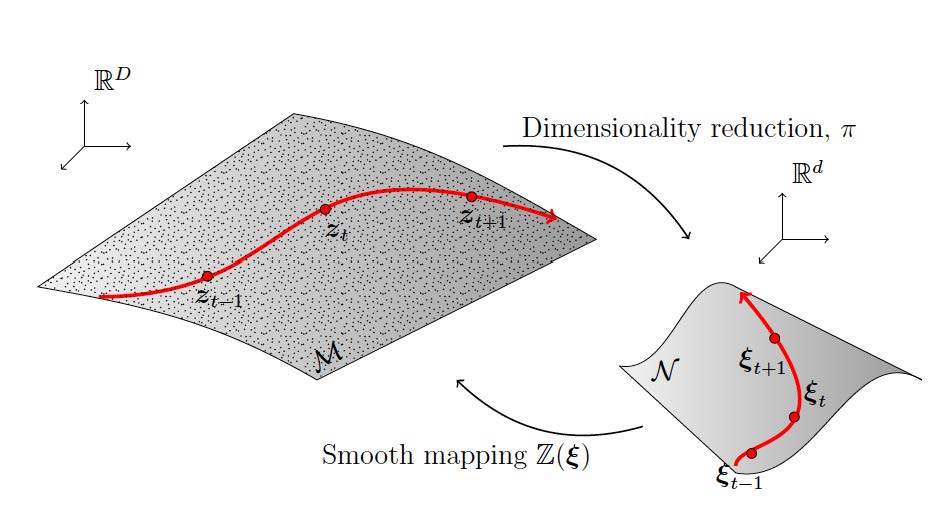Scientific machine learning blends scientific computing and machine learning.
We focus on an approach that has been termed as “physics-informed machine learning” or, more properly, “thermodynamics-informed machine learning”.
With the irruption of the so-called fourth paradigm of science a growing interest is detected on the machine learning of scientific laws. A plethora of methods have been developed that are able to produce more or less accurate predictions about the response of physical systems in previously unseen situations by employing techniques ranging from classical regression to the most sophisticated deep learning methods.
Preprints
- Physics perception in sloshing scenes with guaranteed thermodynamic consistency. B. Moya, A. Badias, D. Gonzalez, F. Chinesta, E. Cueto. Submitted, 2021. [Project video] [arXiv preprint]
- Monitoring weeder robots and anticipating their functioning by using advanced topological data analysis. T. Frahi, A. Sancarlos, M. Galle, X. Beaulieu, A. Chambard, A. Falco, E. Cueto, F. Chinesta. Frontiers in Artificial Intelligence, accepted for publication, 2021. [arXiv preprint]
- Learning stable reduced-order models for hybrid twins. A. Sancarlos, M. Cameron, J.-M. Le Peuvedic, J. Groulier, J-L. Duval, E. Cueto and F. Chinesta. Data-Centric Engineering, accepted for publication, 2021. [Download from arXiv]
- PGD-based advanced nonlinear multiparametric regressions for constructing metamodels at the scarce-data limit. Abel Sancarlos, Victor Champaney, Jean-Louis Duval, Elias Cueto, Francisco Chinesta. Submitted. [Download from Arxiv]
- MORPH-DSLAM: Model Order Reduction for PHysics-based Deformable SLAM. A. Badias, I. Alfaro, D. Gonzalez, F. Chinesta, E. Cueto. Accepted for publication, Transactions on Pattern Analysis and Machine Intelligence, 2021. [arXiv preprint] [video]
- Digital twins that learn and correct themselves. Beatriz Moya, Alberto Badías, Icíar Alfaro, Francisco Chinesta, Elías Cueto. International Journal for Numerical Methods in Engineering, accepted for publication, 2020. [Download PDF of draft]
- A Separated Representation involving Multiple Time Scales within the Proper Generalized Decomposition framework. Angelo Pasquale; Amine Ammar; Antonio Falco; Simona Perotto; Elias Cueto; Jean Louis Duval; Francisco Chinesta. Advanced Modeling and Simulation in Engineering Sciences (2021)8:26[Available as MOX report] [Link to the publisher (OA)]
- Deep learning of thermodynamics-aware reduced-order models from data. Quercus Hernandez, Alberto Badias, David Gonzalez, Francisco Chinesta, Elias Cueto. Computer Methods in Applied Mechanics and Engineering, Volume 379, 113763, 2021. [Download draft from arXiv:2007.03758] [Download from publisher] [GitHub project] [Project Video].
- Learning data-driven reduced elastic and inelastic models of spot-welded patches. Agathe Reille, Victor Champaney, Fatima Daim, Yves Tourbier, Nicolas Hascoet, David Gonzalez, Elias Cueto, Jean Louis Duval, Francisco Chinesta. Mechanics and industry, 22, 32, 2021. [Download from publisher, Open Access]
- From ROM of electrochemistry to AI-based battery digital and hybrid twin. A.Sancarlos, M. Cameron, A. Abel, E. Cueto, J.-L. Duval, F. Chinesta. Archives of Computational Methods in Engineering, 28, 979–1015, 2021. [Download PDF of draft]
- Empowering Advanced Driver-Assistance Systems from Topological Data Analysis. Tarek Frahi, Francisco Chinesta, Antonio Falco, Alberto Badias, Elias Cueto, Hyung Yun Choi, Manyong Han, Jean-Louis Duval. Mathematics, 9(6), 634, 2021. [Download from publisher, OA]
- A novel sparse reduced order formulation for modeling electromagnetic forces in electric motors. A. Sancarlos, E. Cueto, F. Chinesta, J.-L. Duval. Springer-Nature Applied Sciences 3, Article number: 355 (2021). [Download pdf (Open Access)].
- Structure-preserving neural networks. Q. Hernandez, A. Badias, D. Gonzalez, F. Chinesta, E. Cueto. Journal of Computational Physics, Volume 426, 109950, 2021. [Arxiv preprint, link to the publisher, GitHub project page]
- Learning non-Markovian physics from data. D. Gonzalez, F. Chinesta, E. Cueto. Journal of Computational Physics, Volume 428, 109982. 2021. [Download PDF of draft]
Funding Institutions




